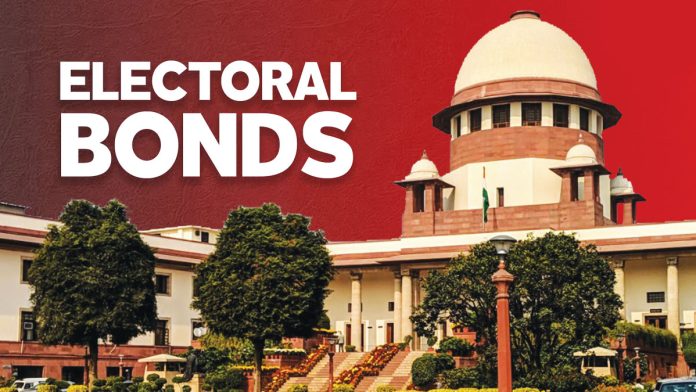The Supreme Court strikes down electoral bond scheme. terming the bonds unconstitutional. Pronouncing its verdict on a batch of petitions challenging the validity of the Electoral Bond scheme, which allows for anonymous funding to political parties, the court declared this scheme unconstitutional. A five judge Constitution bench comprising Chief Justice of India (CJI) DY Chandrachud and Justices Sanjiv Khanna, BR Gavai, JB Pardiwala and Manoj Misra delivered the landmark judgement unanimously. There were two judgments, one authored by CJI DY Chandrachud and the other by Justice Sanjiv Khanna, both concurring.
The Court concluded that the scheme's anonymous nature infringes upon the right to information, thus impeding free speech and expression under Article 19(1)(a) of the Constitution.
“Electoral Bonds Scheme, proviso to Section 29(1)(c) as amended by Section 139 of Income Tax Act and Section 13(b) as amended by Finance Act 2017 is violative of Article 19(1)(a),” the judgment said.
The judgment underscored the potential for abuse inherent in the scheme, highlighting concerns over its propensity to tilt the electoral playing field in favour of the ruling party and foster quid pro quo arrangements between donors and political entities. The Central government in its counter-affidavit maintained that the electoral bonds scheme is transparent. In March 2021, the apex court had dismissed an application seeking a stay on the scheme
The Supreme Court's decision not only nullifies the Electoral Bond scheme but also mandates immediate corrective measures to address the systemic deficiencies plaguing political finance. The bench directed State Bank of India (SBI) to cease the issuance of Electoral Bonds with the immediate effect. The top court instructed SBI to furnish comprehensive details of the political parties that received Electoral Bonds since April 12, 2019, and all the particulars received and submit them to the Election Commission of India by March 6. The details that the SBI will furnish will disclose details of each electoral bond encashed by the political parties, which shall include the date of encashment and the denomination of the electoral bond. The court asked Election Commission to publish the details of Electoral Bonds on its official website by March 13. Data presented in the Lok Sabha indicates that Electoral Bonds worth approximately ₹16,518 crores were purchased from the State Bank of India in 30 tranches. During the just concluded Budget session, Minister of State in the Finance Ministry Pankaj Chaudhry, in a written reply presented the data in Loksabha: “The total value of Electoral Bonds purchased (Phase-I to Phase –XXX) from State Bank of India is about ₹16,518 crores.” The Government of India paid around ₹8.57 crore to the SBI for issuance and redemption commissions, along with about ₹1.90 crore to the Security Printing & Minting Corporation of India Ltd (SPMCIL).
Here's a breakdown of what the judgment entails:
Alternative Measures: The Court emphasized that compromising the Right to Information isn't justified solely for curbing black money. It suggested that there are alternative measures that achieve the purpose with lesser impact on the right to information.
Freedom of Speech and Expression: Chief Justice Chandrachud highlighted that the scheme violates the freedom of speech and expression guaranteed under Article 19(1)(a) of the Constitution. The bench also underscored citizens' right to political privacy and affiliation.
Advantage for the Ruling Party: It was noted that the Electoral Bonds scheme could give undue advantage to the ruling party and might lead to a quid pro quo arrangement due to the close connection between money and politics. “Economic inequality leads to differing level of political engagements. Access to info leads to influencing the policy making and also leading to quid pro quo arrangements may also help a party by the party in power,” the judgment said.
Immediate Action: The State Bank of India (SBI) was ordered to cease the issuance of Electoral Bonds promptly. Additionally, the SBI is required to provide details of bonds issued since April 12, 2019, to the Election Commission of India by March 6. The ECI, in turn, is directed to publish these details on its official website by March 13.
What is Electoral Bond ?
The scheme, introduced by the government in 2017 and notified in 2018, aims to facilitate clean tax-paid funds into political funding through transparent banking channels.
ELECTORAL Bonds are akin to promissory notes or bearer bonds, purchasable by individuals, companies, or associations, provided they are citizens or entities incorporated or established in India.
Only the Political Parties registered under Section 29A of the Representation of the People Act, 1951 (43 of 1951) and which secured not less than one per cent of the votes polled in the last General Election to the Loksabha or the Vidhansabha of a State, shall be eligible to receive the Electoral Bonds. These will be encashed by an eligible Political Party only through a Bank account with the Authorised Bank.
The electoral bonds scheme allows donors to anonymously send funds to a political party after buying bearer bonds from the State Bank of India (SBI).
Ends.

The BuckStopper, run by a group of seasoned journalists, holds the powerful accountable. The buck stops with them, as they cannot shrug off their official responsibilities.



